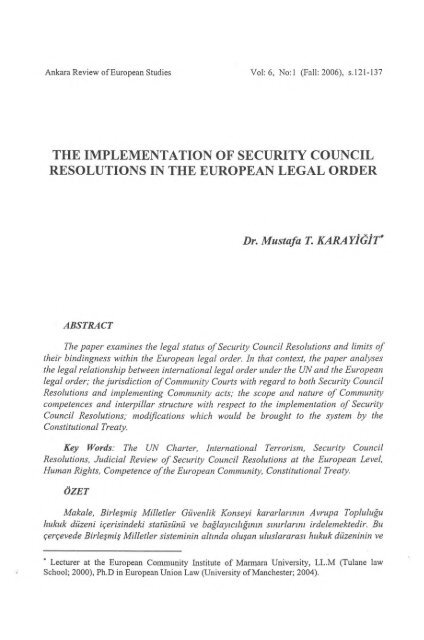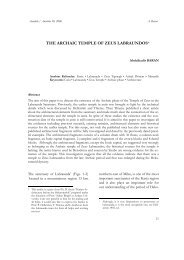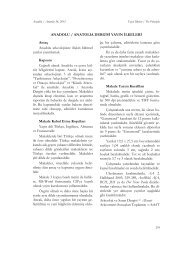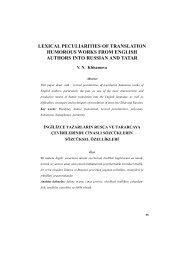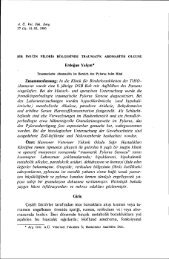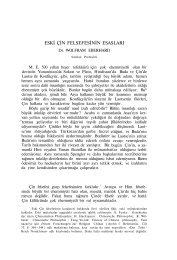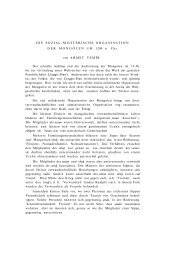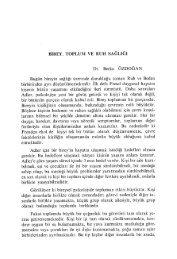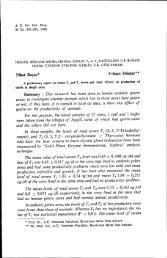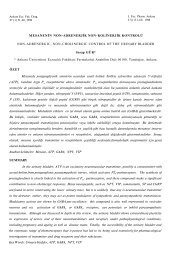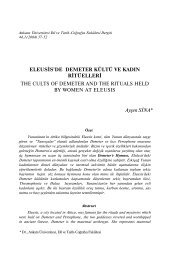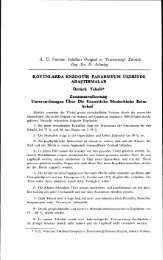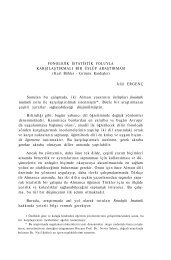the implementation of security council resolutions in the european ...
the implementation of security council resolutions in the european ...
the implementation of security council resolutions in the european ...
Create successful ePaper yourself
Turn your PDF publications into a flip-book with our unique Google optimized e-Paper software.
Ankara Review <strong>of</strong> European Studies<br />
Vol: 6, No:1 (Fall: 2006), s.121-137<br />
THE IMPLEMENTATION OF SECURITY COUNCIL<br />
RESOLUTIONS IN THE EUROPEAN LEGAL ORDER<br />
Dr. Mustafa T. KARAY İĞİT*<br />
ABSTRACT<br />
The paper exam<strong>in</strong>es <strong>the</strong> legal status <strong>of</strong> Security Council Resolutions and limits <strong>of</strong><br />
<strong>the</strong>ir b<strong>in</strong>d<strong>in</strong>gness with<strong>in</strong> <strong>the</strong> European legal order. In that context, <strong>the</strong> paper analyses<br />
<strong>the</strong> legal relationship between <strong>in</strong>ternational legal order under <strong>the</strong> UN and <strong>the</strong> European<br />
legal order; <strong>the</strong> jurisdiction <strong>of</strong> Community Courts with regard to both Security Council<br />
Resolutions and i ınplement<strong>in</strong>g Community acts; <strong>the</strong> scope and nature <strong>of</strong> Community<br />
competences and <strong>in</strong>terpillar structure with respect to <strong>the</strong> <strong>implementation</strong> <strong>of</strong> Security<br />
Council Resolutions; ınodifications which would be brought to <strong>the</strong> system by <strong>the</strong><br />
Constitutional Treaty.<br />
Key Words: The UN Charter, International Terrorism, Security Council<br />
Resolutions, Judicial Review <strong>of</strong> Security Council Resolutions at <strong>the</strong> European Level,<br />
Numan Rights, Competence <strong>of</strong> <strong>the</strong> European Community, Constitutional Treaty.<br />
ÖZET<br />
Makale, Birle şmiş Milletler Güvenlik Konseyi kararlarının Avrupa Toplulu ğu<br />
hukuk düzeni içeris<strong>in</strong>deki statüsünü ve ba ğlayıc ılığın ın s ın ırlarını irdelemektedir. Bu<br />
çerçevede Birle şmiş Milletler sistem<strong>in</strong><strong>in</strong> alt ında oluşan uluslararası hukuk düzen<strong>in</strong><strong>in</strong> ve<br />
* Lecturer at <strong>the</strong> European Community Institute <strong>of</strong> Marmara University, LL.M (Tulane law<br />
School; 2000), Ph.D <strong>in</strong> European Union Law (University <strong>of</strong> Manchester; 2004).
122 MUSTAFA KARAYİĞİT<br />
Topluluk hukuk düzen<strong>in</strong><strong>in</strong> hukuki ili şkisi, Topluluk mahkemeler<strong>in</strong><strong>in</strong> dolayl ı olarak<br />
Güvenlik Konseyi kararlarına ve doğrudan onları uygulamaya geçiren Topluluk<br />
işlemler<strong>in</strong>e ilişk<strong>in</strong> yargısal denetleme yetkiler<strong>in</strong><strong>in</strong> kapsam ı, Avrupa Toplulu ğu'nun BM<br />
Güvenlik Konseyi kararlar ını yer<strong>in</strong>e getirme aç ıs ından sahip olduğu yetkiler<strong>in</strong><strong>in</strong><br />
kapsam ı, bu yetkiler<strong>in</strong> niteliği ile ekonomik ve politik yönleri nedeniyle yapt ırm ılara<br />
ilişk<strong>in</strong> olu şturulan sütunlararası normatif altyap ı ve Anayasal Andla şma 'n ın mevcut<br />
duruma ne gibi değişiklikler getirebilece ği tartışılmaktad ır.<br />
Anahtar Kelimeler: BM Şartı, Uluslararası Terör, Güvenlik Konseyi Kararları ,<br />
Güvenlik Konseyi Kararlar ı n ın AB 'de Yarg ısal Denetimi, İnsan Hakları, Avrupa<br />
Topluluğu'nun Yetkisi, Anayasal Anla şma.<br />
Introduction<br />
As stated <strong>in</strong> Articles 1 and 2 <strong>of</strong> <strong>the</strong> Charter <strong>of</strong> <strong>the</strong> United Nations (here<strong>in</strong>after <strong>the</strong><br />
UN), <strong>the</strong> UN system had been constructed from <strong>the</strong> standpo<strong>in</strong>t <strong>of</strong> traditional<br />
<strong>in</strong>ternational law to deal with matters and relations between <strong>the</strong> states, i.e. <strong>the</strong> ma<strong>in</strong><br />
subjects <strong>of</strong> <strong>in</strong>ternational law, however it went fur<strong>the</strong>r. Accord<strong>in</strong>g to Article 39 <strong>of</strong> <strong>the</strong><br />
UN Charter <strong>the</strong> Security Council, which has <strong>the</strong> pri ınary responsibility for <strong>the</strong><br />
ma<strong>in</strong>tenance <strong>of</strong> <strong>in</strong>ternational peace and <strong>security</strong>, shall determ<strong>in</strong>e <strong>the</strong> existence <strong>of</strong> any<br />
threat to <strong>in</strong>ternational peace and <strong>security</strong> and shall make recommendations or decide<br />
what measures shall be taken <strong>in</strong> accordance with Articles 41 and 42 to ma<strong>in</strong>ta<strong>in</strong> or<br />
restore <strong>in</strong>ternational peace and <strong>security</strong>. In that regard, Article 41 <strong>of</strong> <strong>the</strong> UN Charter<br />
provides that <strong>the</strong> Security Council may decide measures not <strong>in</strong>volv<strong>in</strong>g <strong>the</strong> use <strong>of</strong> armed<br />
force are to be employed and it may call upon <strong>the</strong> Members <strong>of</strong> <strong>the</strong> UN to apply such<br />
measures, which may <strong>in</strong>clude complete or partial <strong>in</strong>terruption <strong>of</strong> economic relations and<br />
<strong>of</strong> rail, sea, air, postal, telegraphic, radio, and o<strong>the</strong>r means <strong>of</strong> communication, and <strong>the</strong><br />
severance <strong>of</strong> diplomatic relations. Briefly, <strong>the</strong> measures taken could be economic,<br />
f<strong>in</strong>ancial, travel-related or diplomatic.<br />
Upon <strong>the</strong> demise <strong>of</strong> <strong>the</strong> Communist bloc, <strong>the</strong> end <strong>of</strong> cold war and <strong>of</strong> <strong>the</strong> paralysis<br />
<strong>of</strong> <strong>the</strong> Security Council led to <strong>in</strong>crease <strong>of</strong> UN sanctions by virtue <strong>of</strong> <strong>the</strong> consensus<br />
provided <strong>in</strong> <strong>the</strong> Security Council. In common usage economic sanctions connote<br />
restrictive measures imposed <strong>in</strong> pursuance <strong>of</strong> foreign policy objectives and <strong>of</strong> national<br />
<strong>security</strong> to produce a change <strong>in</strong> <strong>the</strong> political behaviour <strong>of</strong> ano<strong>the</strong>r state or groups <strong>of</strong><br />
states, to weaken <strong>the</strong> targeted regime(s), <strong>the</strong>reby discourag<strong>in</strong>g it/<strong>the</strong>m from disrupt<strong>in</strong>g<br />
<strong>in</strong>ternational peace and <strong>security</strong>.' Sanctions comb<strong>in</strong>e economic and policy matters. In<br />
I Koutrakos, P., Trade, Foreign Policy and Defence <strong>in</strong> EU Constitutional Law — The Legal<br />
Regulation <strong>of</strong> Sanetions, Exports <strong>of</strong> Dual-Use Goods and Armaments, Hart, Oxford, 2001, at<br />
50-51. Although <strong>the</strong>re is no generally accepted def ınition <strong>of</strong> smart sanctions, <strong>the</strong> concept is<br />
usually assurned to conta<strong>in</strong> <strong>the</strong> freez<strong>in</strong>g <strong>of</strong> f<strong>in</strong>ancial assets, <strong>the</strong> suspension <strong>of</strong> credits and aid, <strong>the</strong>
THE IMPLEMENTATION OF SECURITY COUNCIL RESOLUTIONS 123<br />
1990s <strong>the</strong> Security Council launched smart or targeted sanctions 2 <strong>in</strong> order to restrict as<br />
far as possible <strong>the</strong> impact <strong>of</strong> sanctions on <strong>the</strong> population <strong>of</strong> a country or regime aga<strong>in</strong>st<br />
which sanctions are directed and confın<strong>in</strong>g <strong>the</strong> scope <strong>of</strong> those sanctions to a certa<strong>in</strong><br />
<strong>in</strong>dividuals, groups or entities. As a response to <strong>the</strong> new threat <strong>of</strong> <strong>in</strong>ternational<br />
terrorism, <strong>in</strong> particular to September 11, economic and f<strong>in</strong>ancial sanctions have recently<br />
been taken by <strong>the</strong> Security Council and <strong>in</strong> consequence by <strong>the</strong> Community aga<strong>in</strong>st<br />
<strong>in</strong>dividuals who, entities, groups and non-state actors which have connection with a<br />
country or regime for <strong>the</strong> purpose <strong>of</strong> suppress<strong>in</strong>g <strong>in</strong>ternational terrorism. Therefore<br />
citizens <strong>of</strong> a country became <strong>the</strong> direct subject <strong>of</strong> UN sanctions. The target scope <strong>of</strong><br />
such sanctions was fur<strong>the</strong>r extended by Security Council Resolution No 1390 (2002) to<br />
<strong>in</strong>clude even <strong>in</strong>dividuals who, entities and non-state actors which have no connection<br />
with any country or regime. The war aga<strong>in</strong>st <strong>in</strong>ternational terrorism have recently been<br />
regarded as be<strong>in</strong>g a forever war giyen <strong>the</strong> characteristics <strong>of</strong> recent <strong>resolutions</strong> which are<br />
open-ended and did not have a connection to a certa<strong>in</strong> territory, relate to a certa<strong>in</strong> state,<br />
regime and had no factual or temporal limitation. 3 The ma<strong>in</strong> characteristics <strong>of</strong> those<br />
sanctions have been <strong>in</strong> pursuance <strong>of</strong> <strong>the</strong> elim<strong>in</strong>ation <strong>of</strong> terrorist groups and entities<br />
ra<strong>the</strong>r than change <strong>in</strong> <strong>the</strong>ir behavior, which differentiate <strong>the</strong>m from traditional broad<br />
sanctions.<br />
The paper exam<strong>in</strong>es first <strong>the</strong> legal status <strong>of</strong> Security Council <strong>resolutions</strong> <strong>in</strong> <strong>the</strong><br />
European legal order. Secondly, it scrut<strong>in</strong>izes <strong>the</strong> scope <strong>of</strong> <strong>the</strong> review <strong>of</strong> legality by <strong>the</strong><br />
European Courts <strong>of</strong> Security Council <strong>resolutions</strong> and <strong>of</strong> Community acts implement<strong>in</strong>g<br />
<strong>the</strong>m <strong>in</strong> order to clarify <strong>the</strong> limitation on judicial review <strong>of</strong> <strong>resolutions</strong> and<br />
implement<strong>in</strong>g Community acts <strong>in</strong> <strong>the</strong> Community legal order and <strong>the</strong> limits <strong>of</strong> <strong>the</strong>ir<br />
b<strong>in</strong>d<strong>in</strong>g effect. Thirdly, <strong>the</strong> history <strong>of</strong> <strong>the</strong> <strong>implementation</strong> <strong>of</strong> <strong>resolutions</strong>, <strong>the</strong>ir legal basis<br />
and <strong>the</strong> procedure under which will be briefly po<strong>in</strong>ted out. Fourthly, <strong>the</strong> current legal<br />
bases and procedural rules will be analysed. In that respect, <strong>the</strong> material scope <strong>of</strong><br />
competences under <strong>the</strong> EC Treaty <strong>in</strong> impos<strong>in</strong>g economic and f<strong>in</strong>ancial sanctions<br />
pursuant to <strong>the</strong> stage <strong>of</strong> <strong>in</strong>ternational law and <strong>in</strong>ternational practice will be observed.<br />
Lastly, what difference would <strong>the</strong> Constitutional Treaty provide for is to be exam<strong>in</strong>ed.<br />
denial and limitation <strong>of</strong> access to foreign f<strong>in</strong>ancial markets, trade embargoes, flight bans, <strong>the</strong><br />
denial <strong>of</strong> <strong>in</strong>ternational travel, visas and educational opportunities. See Cameron, I., "UN Targeted<br />
Sanctions, Legal safeguards and <strong>the</strong> European Convention on Hurnan Rights", 72 Nordic<br />
Journal <strong>of</strong> International Law, 159, 2003.<br />
2 Smart sanctions aga<strong>in</strong>st groups or non-state actors began with sanctions aga<strong>in</strong>st UNITA (The<br />
National Union for <strong>the</strong> Total Independence <strong>of</strong> Angola) applied first <strong>in</strong> 1997.<br />
3 For more detail see Cameron, supra note 1; See also Birkhauser, N., "Sanctions <strong>of</strong> <strong>the</strong> Security<br />
Council Aga<strong>in</strong>st Individuals — Some Human Rights Problems", ESIL FORUM 2005, at<br />
.
124 MUSTAFA KARAYİĞİT<br />
The Legal Status <strong>of</strong> Security Council Resolutions with<strong>in</strong> <strong>the</strong> Community<br />
Legal Order<br />
Until <strong>the</strong> Yusuf Case 4 <strong>the</strong> European Courts have not clarifıed <strong>the</strong> legal status <strong>of</strong><br />
Security Council <strong>resolutions</strong> with<strong>in</strong> <strong>the</strong> Community legal order, albeit <strong>the</strong>y had this<br />
opportunity <strong>in</strong> several times. Accord<strong>in</strong>g to this case <strong>the</strong> Court <strong>of</strong> First Instance<br />
(here<strong>in</strong>after <strong>the</strong> CFI) stated that from <strong>the</strong> standpo<strong>in</strong>t <strong>of</strong> <strong>in</strong>ternational law, <strong>the</strong> obligations<br />
<strong>of</strong> <strong>the</strong> Member States <strong>of</strong> <strong>the</strong> UN under <strong>the</strong> UN Charter prevail over every obligation <strong>of</strong><br />
domestic or <strong>of</strong> <strong>in</strong>ternational treaty law that rule <strong>of</strong> primacy is derived first from <strong>the</strong><br />
pr<strong>in</strong>ciples <strong>of</strong> customary <strong>in</strong>ternational law as enshr<strong>in</strong>ed under Article 27 5 <strong>of</strong> <strong>the</strong> Vienna<br />
Convention on <strong>the</strong> law <strong>of</strong> Treaties and second, is expressly laid down <strong>in</strong> Article 103 6 <strong>of</strong><br />
<strong>the</strong> UN Charter. 7 That primacy extends to decisions conta<strong>in</strong>ed <strong>in</strong> a Security Council<br />
resolution, <strong>in</strong> accordance with Article 25 <strong>of</strong> <strong>the</strong> UN Charter under which <strong>the</strong> Members<br />
agree to accept and carry out Security Council decisions. 8 Hav<strong>in</strong>g regard to <strong>the</strong><br />
relationship between <strong>the</strong> obligations <strong>of</strong> <strong>the</strong> Member States <strong>of</strong> <strong>the</strong> Community by virtue<br />
<strong>of</strong> <strong>the</strong> UN Charter and <strong>the</strong>ir obligations under Community law, Article 307 EC, which is<br />
enshr<strong>in</strong>ed not to affect <strong>the</strong> duty <strong>of</strong> <strong>the</strong> Member States concerned to respect third<br />
countries' rights under a prior agreement and to fulfıl <strong>the</strong>ir obligations <strong>the</strong>reunder, states<br />
that "[t]he rights and obligations aris<strong>in</strong>g from agreements concluded before 1 January<br />
1958 or, for acced<strong>in</strong>g States, before <strong>the</strong> date <strong>of</strong> <strong>the</strong>ir accession, between one or more<br />
Member States on <strong>the</strong> one hand, and one or more third countries on <strong>the</strong> o<strong>the</strong>r, shall not<br />
be affected by <strong>the</strong> provisions <strong>of</strong> this Treaty". 9 The CFI held that on <strong>the</strong> one hand fıve <strong>of</strong><br />
six signatory states to <strong>the</strong> EEC Treaty were already members <strong>of</strong> <strong>the</strong> UN on 1 January<br />
1958, as regards <strong>the</strong> Federal Republic <strong>of</strong> Germany, albeit it was not formally a member<br />
<strong>of</strong> <strong>the</strong> UN until 18 September 1973, its duty to perform its obligations under <strong>the</strong> UN<br />
Charter predates 1 January 1958 by virtue <strong>of</strong> <strong>the</strong> F<strong>in</strong>al Act <strong>of</strong> <strong>the</strong> Conference held <strong>in</strong><br />
September-October <strong>in</strong> 1954 and <strong>the</strong> Paris Agreements signed on 23 October 1954, on<br />
4 Case T-306/01, Ahmed Ali Yusuf and Al Barakaat International Foundation v Council <strong>of</strong> <strong>the</strong><br />
European Union and Commission <strong>of</strong> <strong>the</strong> European Communities, 21 Septe ınber 2005. In this<br />
case, <strong>the</strong> action was brought by Yusuf and Al Barakaat International Foundation for annulment <strong>of</strong><br />
first Council Regulation (EC) No 467/2001, second Co ın ınission Regulation (EC) No 2199/2001<br />
and subsequently for Council Regulation (EC) No 881/2002 i ınpos<strong>in</strong>g certa<strong>in</strong> specific restrictive<br />
ıneasures, econoınic and f<strong>in</strong>ancial, directed aga<strong>in</strong>st <strong>in</strong>dividuals and entities associated with<br />
Usaına b<strong>in</strong> Laden, <strong>the</strong> Al-Qaeda network and <strong>the</strong> Taliban p ıırsuant to Security Council<br />
<strong>resolutions</strong> concerned. Argu ınents <strong>of</strong> <strong>the</strong> applicants for annulınent were: <strong>in</strong>co ınpetency <strong>of</strong> <strong>the</strong><br />
Council to adopt those regulations, <strong>in</strong>fr<strong>in</strong>geınent <strong>of</strong> Article 249 EC and <strong>the</strong> breach <strong>of</strong> applicants<br />
funda ınental rights, as regards <strong>the</strong> right to respect for property and <strong>the</strong> pr<strong>in</strong>ciple <strong>of</strong><br />
proportionality, <strong>the</strong> right to a faiz hear<strong>in</strong>g and <strong>the</strong> right to effective judicial review.<br />
5 Accord<strong>in</strong>g to this provision a party may not <strong>in</strong>voke <strong>the</strong> provisions <strong>of</strong> its <strong>in</strong>ternal law as<br />
justifıcation for its failure to perform a treaty.<br />
6 Article 103 <strong>of</strong> <strong>the</strong> UN Charter provides that <strong>in</strong> <strong>the</strong> event <strong>of</strong> conflict between <strong>the</strong> obligations <strong>of</strong><br />
<strong>the</strong> Member States <strong>of</strong> <strong>the</strong> UN and <strong>the</strong>ir obligations under any o<strong>the</strong>r <strong>in</strong>ternational agreement, <strong>the</strong>ir<br />
obligations under <strong>the</strong> UN Charter shall prevail.<br />
7 Case T-306/01, supra note 4, paras. 231-233.<br />
8 Ibid., para. 234.<br />
9 Ibid., paras. 235-236.
THE IMPLEMENTATION OF SECURITY COUNCIL RESOLUTIONS 125<br />
<strong>the</strong> o<strong>the</strong>r hand all subsequently access<strong>in</strong>g Member States to <strong>the</strong> Community were<br />
members <strong>of</strong> <strong>the</strong> UN before <strong>the</strong>ir accessioni ° Moreover, Article 297 EC was specifically<br />
<strong>in</strong>troduced <strong>in</strong>to <strong>the</strong> Treaty to observe that rule <strong>of</strong> primacy." Consequently, Security<br />
Council <strong>resolutions</strong> adopted under Chapter VII <strong>of</strong> <strong>the</strong> UN Charter are b<strong>in</strong>d<strong>in</strong>g on all <strong>the</strong><br />
Member States <strong>of</strong> <strong>the</strong> Community which must take all measures necessary to ensure that<br />
those <strong>resolutions</strong> are implemented. 12 The CFI <strong>the</strong>n clarified follow<strong>in</strong>g to <strong>the</strong><br />
considerations aforementioned that <strong>the</strong> Member States may, an <strong>in</strong>deed must, leave<br />
unapplied any provision <strong>of</strong> Community law, whe<strong>the</strong>r a provision <strong>of</strong> primary law or a<br />
general pr<strong>in</strong>ciple <strong>of</strong> that law, that raises any impediment to <strong>the</strong> proper fulf ılment <strong>of</strong> <strong>the</strong>ir<br />
obligations under <strong>the</strong> UN Charter. I3<br />
Conversely, <strong>the</strong> CFI held that unlike its Member States, <strong>the</strong> Community is not<br />
directly bound by <strong>the</strong> UN Charter and it is not <strong>the</strong>refore required under public<br />
<strong>in</strong>ternational law to accept and fulfil Security Council <strong>resolutions</strong> <strong>in</strong> accordance with<br />
Article 25 <strong>of</strong> <strong>the</strong> UN Charter on <strong>the</strong> ground that <strong>the</strong> Community is nei<strong>the</strong>r an addressee<br />
<strong>of</strong> Security Council <strong>resolutions</strong>, nor <strong>the</strong> successor to <strong>the</strong> rights and obligations <strong>of</strong> <strong>the</strong><br />
Member States for <strong>the</strong> purposes <strong>of</strong> public <strong>in</strong>ternational law. I4 The CFI took a stand that<br />
<strong>the</strong> Community must never<strong>the</strong>less be regarded as be<strong>in</strong>g bound by <strong>the</strong> obligations under<br />
<strong>the</strong> UN Charter <strong>in</strong> <strong>the</strong> same way as its Member States by virtue <strong>of</strong> <strong>the</strong> EC Treatyi s<br />
Hav<strong>in</strong>g regard to <strong>the</strong> delimitation <strong>of</strong> competences between <strong>the</strong> Community and <strong>the</strong><br />
Member States, <strong>the</strong> CFI held that by conclud<strong>in</strong>g a treaty between <strong>the</strong>m <strong>the</strong> Member<br />
States could not transfer to <strong>the</strong> Community more powers than <strong>the</strong>y possessed or<br />
withdraw from <strong>the</strong>ir obligations to third parties under <strong>the</strong> UN Charter. I Ğ The fact that<br />
<strong>the</strong>ir desire to perform <strong>the</strong>ir obligations under <strong>the</strong> UN Charter follows from <strong>the</strong> very<br />
provisions <strong>of</strong> <strong>the</strong> EC Treaty, which are clarified <strong>in</strong> particular <strong>in</strong> Articles 297 and 307<br />
EC, implies a duty on <strong>the</strong> Community <strong>in</strong>stitutions not to impede <strong>the</strong> performance <strong>of</strong><br />
those obligations. 17 Giyen <strong>the</strong> characteristics <strong>of</strong> delimitation <strong>of</strong> competences with<strong>in</strong> <strong>the</strong><br />
Community legal order, <strong>in</strong>s<strong>of</strong>ar as <strong>the</strong> competences necessary for <strong>the</strong> fulfilment <strong>of</strong><br />
Member States' obligations have been transferred to <strong>the</strong> Community, <strong>the</strong> Member<br />
States have undertaken, pursuant to public <strong>in</strong>ternational law, to ensure that <strong>the</strong><br />
Community itself should exercise those competences to that endi s<br />
Accord<strong>in</strong>gly, on <strong>the</strong> one hand <strong>in</strong> accordance with Article 48(2) <strong>of</strong> <strong>the</strong> UN Charter,<br />
Security Council decisions Ishall be carried out by <strong>the</strong> Members <strong>of</strong> <strong>the</strong> United Nations<br />
directly and through <strong>the</strong>ir action <strong>in</strong> <strong>the</strong> appropriate <strong>in</strong>ternational agencies <strong>of</strong> which <strong>the</strong>y<br />
are members', on <strong>the</strong> o<strong>the</strong>r hand accord<strong>in</strong>g to settled case law, <strong>the</strong> Community must<br />
1° Ibid., para. 237.<br />
11<br />
Ibid., para. 238.<br />
12 Ibid., para. 239.<br />
13 Ibid., para. 240.<br />
14 Ibid., para. 242.<br />
15 Ibid., para. 243.<br />
16 Ibid., para. 245.<br />
17 Ibid., paras. 246-247.<br />
18 Ibid., para. 248.
126 MUSTAFA KARAYİĞİT<br />
respect <strong>in</strong>ternational law <strong>in</strong> <strong>the</strong> exercise <strong>of</strong> its competences and Community law must be<br />
<strong>in</strong>terpreted, and its scope lirnited, <strong>in</strong> <strong>the</strong> light <strong>of</strong> <strong>in</strong>ternational law.' 9 The CFI by mak<strong>in</strong>g<br />
an analogy with <strong>the</strong> <strong>in</strong>ternational Fruit Case,2° <strong>the</strong>n ma<strong>in</strong>ta<strong>in</strong>ed that Article 301 EC was<br />
<strong>in</strong>troduced <strong>in</strong>to <strong>the</strong> Treaty so as to provide a specific legal basis for <strong>the</strong> economic<br />
sanctions that <strong>the</strong> Community may need to impose on third countries for political<br />
reasons <strong>in</strong> connection with <strong>the</strong> CFSP, most commonly pursuant to a Security Council<br />
resolution» Ins<strong>of</strong>ar as under <strong>the</strong> EC Treaty <strong>the</strong> Community has assumed competences<br />
previously exercised by <strong>the</strong> Member States <strong>in</strong> <strong>the</strong> field governed by <strong>the</strong> UN Charter, <strong>the</strong><br />
provisions <strong>of</strong> that Charter have <strong>the</strong> effect <strong>of</strong> b<strong>in</strong>d<strong>in</strong>g <strong>the</strong> Community. 22 Not only is <strong>the</strong><br />
Community <strong>the</strong>refore under <strong>the</strong> duty not to <strong>in</strong>fr<strong>in</strong>ge <strong>the</strong> Member States' obligations<br />
under <strong>the</strong> UN Charter or not to impede <strong>the</strong>ir performance, but also <strong>in</strong> <strong>the</strong> exercise <strong>of</strong> its<br />
competences it is bound by virtue <strong>of</strong> <strong>the</strong> EC Treaty to adopt all <strong>the</strong> measures necessary<br />
to enable <strong>the</strong> Member States to fulfil those obligations. 23<br />
In consequence, <strong>the</strong> CFI gives Security Council <strong>resolutions</strong> primacy over even<br />
primary Community law, <strong>in</strong> an <strong>in</strong>direct way by virtue <strong>of</strong> <strong>the</strong> EC Treaty, and over <strong>the</strong><br />
European Convention on Human Rights. However, it rema<strong>in</strong>s to be seen whe<strong>the</strong>r <strong>the</strong><br />
ECtHR confirms this primacy over <strong>the</strong> ECHR upon an application made after <strong>the</strong><br />
exhaustion <strong>of</strong> <strong>in</strong>ternal remedies. From <strong>the</strong> perspective <strong>of</strong> <strong>the</strong> CFI, <strong>the</strong> UN Charter seems<br />
as <strong>the</strong> constitutional <strong>in</strong>strument <strong>of</strong> <strong>in</strong>ternational legal order hav<strong>in</strong>g priority over national<br />
constitutions, <strong>the</strong> constitutional charter <strong>of</strong> <strong>the</strong> Community legal order and <strong>the</strong> ECHR.<br />
1. The Scope <strong>of</strong> <strong>the</strong> Review <strong>of</strong> Legality by <strong>the</strong> European Courts <strong>of</strong> Security<br />
Council Resolutions and <strong>of</strong> Community Acts Implement<strong>in</strong>g Them<br />
To what extent Security Council <strong>resolutions</strong> have primacy over primary<br />
Community law was exam<strong>in</strong>ed <strong>in</strong> <strong>the</strong> same case by <strong>the</strong> CFI. The CFI ma<strong>in</strong>ta<strong>in</strong>ed that<br />
although <strong>the</strong> Community is based on <strong>the</strong> rule <strong>of</strong> law and <strong>the</strong> pr<strong>in</strong>ciple <strong>of</strong> judicial control<br />
f<strong>in</strong>ds expression <strong>in</strong> <strong>the</strong> right to submit <strong>the</strong> lawfulness <strong>of</strong> any regulation to <strong>the</strong> CFI under<br />
Article 230 EC, <strong>the</strong> question arises whe<strong>the</strong>r <strong>the</strong>re exist any structural limits, imposed by<br />
general <strong>in</strong>ternational law or by <strong>the</strong> EC Treaty, on <strong>the</strong> judicial review at <strong>the</strong> Community<br />
leve1. 24 As regards <strong>the</strong> <strong>implementation</strong> <strong>of</strong> Security Council <strong>resolutions</strong> <strong>in</strong> <strong>the</strong><br />
Community legal order, s<strong>in</strong>ce <strong>the</strong> <strong>in</strong>stitutions act under circumscribed powers without<br />
any autonomous discretion (<strong>the</strong>y could nei<strong>the</strong>r directly alter <strong>the</strong> content <strong>of</strong> <strong>resolutions</strong><br />
nor set up any mechanism capable <strong>of</strong> giv<strong>in</strong>g rise to such alteration), any review <strong>of</strong> <strong>the</strong><br />
<strong>in</strong>ternal lawfulness <strong>of</strong> any regulation would imply that <strong>the</strong> Court is to consider,<br />
<strong>in</strong>directly, <strong>the</strong> lawfulness <strong>of</strong> those <strong>resolutions</strong> concerned. 25 In that regard, <strong>the</strong> orig<strong>in</strong> <strong>of</strong><br />
19 Ibid., para. 249.<br />
20 Jo<strong>in</strong>ed Cases 21 to 24/72 International Fruit Coınpany NV and o<strong>the</strong>rs v Produktschap voor<br />
Groenten en Fruit [1972] ECR 1219.<br />
21 Case T-306/0I, supra note 4, para. 252.<br />
22 Ibid., para. 253.<br />
23 Ibid., para. 254.<br />
24 Ibid., paras. 260-263.<br />
25 Ibid., paras. 265-266.
THE IMPLEMENTATION OF SECURITY COUNCIL RESOLUTIONS 127<br />
<strong>the</strong> illegality <strong>of</strong> would have to be sought not <strong>in</strong> <strong>the</strong> adoption <strong>of</strong> regulations<br />
implement<strong>in</strong>g <strong>the</strong>m, but <strong>in</strong> Security Council <strong>resolutions</strong> concerned, 26 s<strong>in</strong>ce such a<br />
limitation <strong>of</strong> jurisdiction is necessary as a corollary to <strong>the</strong> pr<strong>in</strong>ciples aforementioned <strong>in</strong><br />
terms <strong>of</strong> <strong>the</strong> relationship between <strong>the</strong> <strong>in</strong>ternational legal order under <strong>the</strong> UN and <strong>the</strong><br />
Community legal order. 27<br />
Giyen that while adopt<strong>in</strong>g <strong>resolutions</strong> <strong>in</strong> accordance with Chapter VII <strong>of</strong> <strong>the</strong> UN<br />
Charter, <strong>the</strong> Security Council has <strong>the</strong> primary responsibility to determ<strong>in</strong>e what<br />
constitutes a threat to <strong>in</strong>ternational peace and <strong>security</strong> and measures required to<br />
ma<strong>in</strong>ta<strong>in</strong> or restore <strong>in</strong> <strong>the</strong> pursuance <strong>of</strong> which, that escape <strong>the</strong> jurisdiction <strong>of</strong> national or<br />
Community authorities and courts, subject only to <strong>the</strong> <strong>in</strong>herent right <strong>of</strong> <strong>in</strong>dividual or<br />
collective self-defence po<strong>in</strong>ted out <strong>in</strong> Article 51 <strong>of</strong> <strong>the</strong> UN Charter. 28 Accord<strong>in</strong>gly,<br />
Security Council <strong>resolutions</strong> fall, <strong>in</strong> pr<strong>in</strong>ciple, outside <strong>the</strong> scope <strong>of</strong> European Courts'<br />
judicial review and <strong>the</strong> European Courts have no authority to call <strong>in</strong> question, even<br />
<strong>in</strong>directly, <strong>the</strong>ir legality <strong>in</strong> <strong>the</strong> light <strong>of</strong> Community law, on <strong>the</strong> contrary are bound, so far<br />
as possible, to <strong>in</strong>terpret and apply that law <strong>in</strong> a manner compatible with <strong>the</strong> Member<br />
States' obligations under <strong>the</strong> UN Charter. 29 Never<strong>the</strong>less, <strong>the</strong> European Courts are<br />
empowered to check, <strong>in</strong>directly, <strong>the</strong> lawfulness <strong>of</strong> Security Council <strong>resolutions</strong> <strong>in</strong><br />
respect <strong>of</strong> jus cogens, which are peremptory norms <strong>of</strong> general <strong>in</strong>ternational law and<br />
<strong>in</strong>transgressible pr<strong>in</strong>ciples <strong>of</strong> <strong>in</strong>ternational customary law, from which no derogation is<br />
possible, as a body <strong>of</strong> superior rules <strong>of</strong> public <strong>in</strong>ternational law b<strong>in</strong>d<strong>in</strong>g all subjects <strong>of</strong><br />
<strong>in</strong>ternational law, <strong>in</strong>clud<strong>in</strong>g <strong>the</strong> bodies <strong>of</strong> <strong>the</strong> UN. 3° International law <strong>the</strong>refore permits<br />
<strong>the</strong> <strong>in</strong>terference that <strong>the</strong>re exists one limit to <strong>the</strong> pr<strong>in</strong>ciple <strong>of</strong> primacy <strong>of</strong> Security<br />
Council <strong>resolutions</strong> and <strong>the</strong>ir b<strong>in</strong>d<strong>in</strong>g effect: <strong>the</strong> observation <strong>of</strong> fundamental peremptory<br />
provisions <strong>of</strong> jus cogens by those <strong>resolutions</strong>, <strong>in</strong> <strong>the</strong> failure <strong>of</strong> which, however<br />
improbable that may be, <strong>the</strong>y would have no effect <strong>of</strong> b<strong>in</strong>d<strong>in</strong>g <strong>the</strong> Member States <strong>of</strong> <strong>the</strong><br />
UN, or, <strong>in</strong> consequence, <strong>the</strong> Community. 31 If it was understood <strong>in</strong> comb<strong>in</strong>ation with <strong>the</strong><br />
previous part, Security Council <strong>resolutions</strong> adopted under Chapter VII <strong>of</strong> <strong>the</strong> UN<br />
Charter, unless <strong>the</strong>y violate jus cogens, have supremacy over primary Community law<br />
and also have <strong>the</strong> effect <strong>of</strong> b<strong>in</strong>d<strong>in</strong>g <strong>the</strong> Community with<strong>in</strong> <strong>the</strong> scope <strong>of</strong> conferred<br />
competences.<br />
A Brief History <strong>of</strong> Pre-Maastricht Economic Sanctions<br />
Until <strong>the</strong> development <strong>of</strong> <strong>the</strong> European Political Cooperation <strong>in</strong> 1980s, <strong>the</strong><br />
Member States had been regarded as sole competent under Article 297 EC to impose<br />
economic sanctions for political objectives under <strong>the</strong> Rhodesia Doctr<strong>in</strong>e aga<strong>in</strong>st third<br />
countries. Article 297 EC states that "Member States shall consult each o<strong>the</strong>r with a<br />
view to tak<strong>in</strong>g toge<strong>the</strong>r <strong>the</strong> steps needed to prevent <strong>the</strong> function<strong>in</strong>g <strong>of</strong> <strong>the</strong> common<br />
26 Ibid., para. 266.<br />
27 Ibid., para. 269.<br />
28 Ibid., para. 270.<br />
29 Ibid., para. 276.<br />
30 Ibid., paran. 277-278, 282.<br />
31 Ibid., para. 281.
128 MUSTAFA KARAYİĞİT<br />
market be<strong>in</strong>g affected by measures which a Member State may be called upon to take <strong>in</strong><br />
<strong>the</strong> event <strong>of</strong> serious <strong>in</strong>ternal disturbances affect<strong>in</strong>g <strong>the</strong> ma<strong>in</strong>tenance <strong>of</strong> law and order, <strong>in</strong><br />
<strong>the</strong> event <strong>of</strong> war, serious <strong>in</strong>ternational tension constitut<strong>in</strong>g a threat <strong>of</strong> war, or <strong>in</strong> order to<br />
carry out obligations it has accepted for <strong>the</strong> purpose <strong>of</strong> ma<strong>in</strong>ta<strong>in</strong><strong>in</strong>g peace and<br />
<strong>in</strong>ternational <strong>security</strong>." The Member States imposed those restrictive measures pursuant<br />
to consultations and cooperation, as stated <strong>in</strong> Article 297 EC, so as to prevent <strong>the</strong><br />
function<strong>in</strong>g <strong>of</strong> <strong>the</strong> common market from be<strong>in</strong>g affected by such measures. For <strong>in</strong>stance,<br />
Security Council Resolutions Nos 216 (1965), 217 (1965) and 253 (1968) demand<strong>in</strong>g<br />
from <strong>the</strong> <strong>in</strong>ternational community to cease its trade relations with Rhodesia were<br />
implemented by <strong>the</strong> Member States under national rules on <strong>the</strong> basis <strong>of</strong> Article 297 EC,<br />
which led to <strong>the</strong> adoption <strong>of</strong> Rhodesia doctr<strong>in</strong>e.<br />
Never<strong>the</strong>less, <strong>the</strong>ir <strong>implementation</strong> gaye rise to practical problems render<strong>in</strong>g <strong>the</strong><br />
whole embargo <strong>in</strong>effective by virtue <strong>of</strong> lack <strong>of</strong> coord<strong>in</strong>ation, s<strong>in</strong>ce <strong>the</strong>y had been<br />
implemented with national measures <strong>of</strong> differ<strong>in</strong>g content and at different times. 32 The<br />
development <strong>of</strong> <strong>the</strong> common commercial policy and <strong>the</strong> improvement <strong>of</strong> <strong>the</strong> European<br />
political cooperation, on <strong>the</strong> o<strong>the</strong>r hand, made possible to recourse to a Community<br />
<strong>in</strong>strument on <strong>the</strong> basis <strong>of</strong> Article 133 EC <strong>in</strong> order to ensure uniform <strong>implementation</strong> <strong>of</strong><br />
Security Council <strong>resolutions</strong> throughout <strong>the</strong> Community through <strong>the</strong> monitor <strong>of</strong> <strong>the</strong><br />
Commission for <strong>the</strong> sake <strong>of</strong> effectiveness. 33 Giyen <strong>the</strong> difficulty <strong>in</strong> separation <strong>of</strong><br />
economic and politic issues <strong>in</strong> external relations, a k<strong>in</strong>d <strong>of</strong> dual structure was thus<br />
established, which may refer to <strong>the</strong> second phase <strong>in</strong> impos<strong>in</strong>g sanctions: economic<br />
sanctions were taken on <strong>the</strong> basis <strong>of</strong> Article 133 EC pursuant to a political decision<br />
atta<strong>in</strong>ed by consultations and consensus with<strong>in</strong> <strong>the</strong> framework <strong>of</strong> <strong>the</strong> European Political<br />
Cooperation, which was <strong>the</strong> precursor <strong>of</strong> <strong>the</strong> CFSP. In <strong>the</strong> transitional stage to <strong>the</strong><br />
second phase, restrictive measures have been adopted both at <strong>the</strong> Community and<br />
national level on <strong>the</strong> basis <strong>of</strong> Article 133 EC on <strong>the</strong> one side and Article 297 EC on <strong>the</strong><br />
o<strong>the</strong>r for a while. It is worth mention<strong>in</strong>g that <strong>the</strong> Community <strong>in</strong>volvement <strong>in</strong> impos<strong>in</strong>g<br />
economic measures however was regarded as <strong>the</strong> effective and uniform imposition,<br />
ra<strong>the</strong>r than as recognition <strong>of</strong> Community competence, 34 on <strong>the</strong> ground that <strong>the</strong><br />
Community competence <strong>in</strong> impos<strong>in</strong>g restrictive measures on <strong>the</strong> basis <strong>of</strong> Article 133 EC<br />
is <strong>of</strong> exclusive nature. As regards second phase, Security Council Resolutions Nos 660<br />
(1990) and 661 (1990) aga<strong>in</strong>st Iraq are implemented by Council Regulation 2340/90 on<br />
<strong>the</strong> basis <strong>of</strong> Article 133 EC pursuant to consultations and a follow<strong>in</strong>g decision taken by<br />
consensus <strong>in</strong> <strong>the</strong> framework <strong>of</strong> European Political Cooperation. The Maastricht revision<br />
<strong>in</strong>troduc<strong>in</strong>g Articles 60 and 301 EC <strong>in</strong>to <strong>the</strong> EC Treaty, as autonomous legal basis,<br />
brought <strong>the</strong> third phase, which is <strong>the</strong> current stand, <strong>in</strong> impos<strong>in</strong>g economic and f<strong>in</strong>ancial<br />
sanctions adopted mostly pursuant to Security Council <strong>resolutions</strong> <strong>in</strong> <strong>the</strong> Community<br />
legal order.<br />
32 Koutrakos, supra note 1, at 58.<br />
33 The preamble <strong>of</strong> Regulation 2340/90 at OJ 1990 L 213/1. See also Ibid., at 63-64.<br />
34 Koutrakos, supra note 1, at 58.
THE IMPLEMENTATION OF SECURITY COUNCIL RESOLUTIONS 129<br />
The Current Stand <strong>in</strong> <strong>the</strong> Implementation <strong>of</strong> Security Council Resolutions<br />
Articles 60 and 301 EC<br />
Article 301 EC <strong>in</strong>corporated <strong>the</strong> preced<strong>in</strong>g dual construction <strong>in</strong>to <strong>the</strong> new<br />
established pillar structure and established a cross pillar l<strong>in</strong>k between <strong>the</strong> Community<br />
pillar and <strong>the</strong> CFSP pillar. Article 301 EC declares that "[w]here it is provided, <strong>in</strong> a<br />
common position or <strong>in</strong> a jo<strong>in</strong>t action adopted accord<strong>in</strong>g to <strong>the</strong> provisions <strong>of</strong> <strong>the</strong> Treaty<br />
on European Union relat<strong>in</strong>g to <strong>the</strong> common foreign and <strong>security</strong> policy, for an action by<br />
<strong>the</strong> Community to <strong>in</strong>terrupt or to reduce, <strong>in</strong> part or completely, economic relations with<br />
one or more third countries, <strong>the</strong> Council shall take <strong>the</strong> necessary urgent measures. The<br />
Council shall act by a qualifıed majority on a proposal from <strong>the</strong> Commission." Policy<br />
concern is a matter <strong>of</strong> CFSP, while <strong>the</strong> means <strong>of</strong> achiev<strong>in</strong>g that policy is economic and<br />
so Community matter.<br />
Hav<strong>in</strong>g regard to f<strong>in</strong>ancial sanctions Article 60 EC provides that "MI', <strong>in</strong> <strong>the</strong> cases<br />
envisaged <strong>in</strong> Article 301, action by <strong>the</strong> Community is deemed necessary, <strong>the</strong> Council<br />
may, <strong>in</strong> accordance with <strong>the</strong> procedure provided for <strong>in</strong> Article 301, take <strong>the</strong> necessary<br />
urgent measures on <strong>the</strong> movement <strong>of</strong> capital and on payments as regards <strong>the</strong> third<br />
countries concerned." Article 60 EC provides that accord<strong>in</strong>g to <strong>the</strong> same procedure<br />
provided for <strong>in</strong> Article 301 EC, <strong>the</strong> Council may take <strong>the</strong> necessary urgent measures on<br />
<strong>the</strong> movement <strong>of</strong> capital and on payments aga<strong>in</strong>st third countries.<br />
Common position is an <strong>in</strong>strument adopted by unanimity on <strong>the</strong> basis <strong>of</strong> Article 15<br />
<strong>of</strong> <strong>the</strong> Treaty European Union (here<strong>in</strong>after <strong>the</strong> TEU) and def ınes <strong>the</strong> approach <strong>of</strong> <strong>the</strong><br />
Union to a particular matter <strong>of</strong> a geographical or <strong>the</strong>matic nature <strong>in</strong> terms <strong>of</strong> which <strong>the</strong><br />
Member States shall ensure that <strong>the</strong>ir national policies conform to it; whereas jo<strong>in</strong>t<br />
action, which also is adopted by unanimity on <strong>the</strong> basis <strong>of</strong> Article 14 <strong>of</strong> <strong>the</strong> TEU, shall<br />
address specific situations where operational action by <strong>the</strong> Union is deemed to be<br />
required. The common positions, which have been primarily adopted for <strong>the</strong><br />
<strong>implementation</strong> <strong>of</strong> Security Council <strong>resolutions</strong>, <strong>in</strong>clude <strong>in</strong>structions to <strong>the</strong> Community<br />
orig<strong>in</strong>ally laid down <strong>in</strong> <strong>resolutions</strong> for fulfill<strong>in</strong>g obligations stemm<strong>in</strong>g from <strong>the</strong> UN<br />
Charter.<br />
The Maastricht revision explicitly established a bridge between Community<br />
actions impos<strong>in</strong>g economic and f<strong>in</strong>ancial sanctions under Articles 60 and 301 EC and<br />
<strong>the</strong> objectives <strong>of</strong> <strong>the</strong> Treaty on European Union <strong>in</strong> <strong>the</strong> sphere <strong>of</strong> extemal relations, 35<br />
which reflects a cross pillar dimension. The CFI considers Articles 60 and 301 EC quite<br />
special provisions <strong>of</strong> <strong>the</strong> EC Treaty, <strong>in</strong> that <strong>the</strong>y expressly contemplate situations <strong>in</strong><br />
which action by <strong>the</strong> Community might be proved to be necessary so as to achieve, not<br />
one <strong>of</strong> <strong>the</strong> Community objectives enshr<strong>in</strong>ed <strong>in</strong> <strong>the</strong> EC Treaty but ra<strong>the</strong>r one <strong>of</strong> <strong>the</strong><br />
35 Case T-306/01, supra note 4, para. 159.
130 MUSTAFA KARAYİĞİT<br />
objectives <strong>of</strong> <strong>the</strong> Union under <strong>the</strong> CFSP, <strong>the</strong> <strong>implementation</strong> <strong>of</strong> which f<strong>in</strong>ds its foot<strong>in</strong>g<br />
on <strong>the</strong> Community pillar pursuant to a prior common position or jo<strong>in</strong>t action adopted. 36<br />
The Maastricht Treaty, <strong>in</strong> that respect, established an explicit exemption to <strong>the</strong><br />
general rule enshr<strong>in</strong>ed <strong>in</strong> Article 47 <strong>of</strong> <strong>the</strong> TEU for <strong>the</strong> purpose <strong>of</strong> aim<strong>in</strong>g at<br />
safeguard<strong>in</strong>g <strong>the</strong> acquis communautaire that Union law may not have any b<strong>in</strong>d<strong>in</strong>g effect<br />
for <strong>the</strong> <strong>in</strong>stitutions act<strong>in</strong>g <strong>in</strong> <strong>the</strong> Community pillar, <strong>the</strong> <strong>in</strong>stitutions <strong>the</strong>refore, under <strong>the</strong><br />
pr<strong>in</strong>ciple <strong>of</strong> consistency enabl<strong>in</strong>g <strong>the</strong> Union served by a s<strong>in</strong>gle <strong>in</strong>stitutional framework<br />
to ensure <strong>the</strong> consistency <strong>of</strong> external activities <strong>of</strong> as a whole <strong>in</strong> <strong>the</strong> context <strong>of</strong> <strong>the</strong><br />
Union's external relations, <strong>security</strong>, economic and development policies, are obliged by<br />
virtue <strong>of</strong> <strong>the</strong> EC Treaty to implement an act taken under <strong>the</strong> second pillar, i.e. a common<br />
position or jo<strong>in</strong>t action. 37<br />
Article 301 EC constitutes an autonomous legal basis for more comprehensive<br />
measures than provided for by Article 133 EC with<strong>in</strong> <strong>the</strong> limited scope <strong>of</strong> <strong>the</strong> common<br />
commercial policy, compris<strong>in</strong>g also subject-matters such as development aid, transport<br />
services. However, Article 301 EC should be regarded as regulat<strong>in</strong>g provision ra<strong>the</strong>r<br />
than a genu<strong>in</strong>e empower<strong>in</strong>g provision, 38 s<strong>in</strong>ce it does not enable <strong>the</strong> Community to act<br />
<strong>in</strong> fıelds which are not already fallen with<strong>in</strong> <strong>the</strong> scope <strong>of</strong> its actual competences,<br />
although those subject-matters may signify <strong>the</strong> existence <strong>of</strong> its non-exclusive implied<br />
external competences on <strong>the</strong> basis <strong>of</strong> its <strong>in</strong>ternal competences. The scope <strong>of</strong> <strong>the</strong><br />
Community competence <strong>in</strong> impos<strong>in</strong>g economic measures under Article 301 EC is<br />
<strong>the</strong>refore conf<strong>in</strong>ed to <strong>the</strong> ambit <strong>of</strong> its exist<strong>in</strong>g competences to be exercised<br />
<strong>in</strong>dependently <strong>of</strong> <strong>the</strong> enactment <strong>of</strong> <strong>in</strong>ternal legislation. 39 The requirement <strong>of</strong> a prior<br />
common position or jo<strong>in</strong>t action also signifies that Community competence under<br />
Article 301 EC is conditional. 4° However, this non-exclusivity connotes only <strong>the</strong> field<br />
fall<strong>in</strong>g outside <strong>the</strong> ambit <strong>of</strong> <strong>the</strong> common commercial policy, <strong>in</strong> which <strong>the</strong> Community<br />
has exclusive competences. Accord<strong>in</strong>gly, Article 301 EC respects <strong>the</strong> delimitation <strong>of</strong><br />
competences between <strong>the</strong> Community and <strong>the</strong> Member States: whereas economic<br />
measures related to <strong>the</strong> subject-matters which fail with<strong>in</strong> <strong>the</strong> scope <strong>of</strong> <strong>the</strong> common<br />
commercial policy and <strong>in</strong> terms <strong>of</strong> which <strong>the</strong> Community has acquired exclusive<br />
implied competences are exclusive, economic measures related to <strong>the</strong> subject-matters<br />
exceed<strong>in</strong>g <strong>the</strong> scope <strong>of</strong> <strong>the</strong> common commercial policy and <strong>in</strong> terms <strong>of</strong> which <strong>the</strong><br />
Community has only non-exclusive implied competences are shared. 41<br />
36 Ibid., paras. 160-161.<br />
37 Lukaschek, A. "Economic Sanctions and <strong>the</strong> European Union's Legal Framework" <strong>in</strong> S.<br />
Griller, B. Weidel (eds.), External Economic Relations and Foreign Policy <strong>in</strong> <strong>the</strong> European<br />
Union, Spr<strong>in</strong>ger, WienNewYork, 2002, at 343.<br />
38 Ibid., at 345.<br />
39 Ibid., at 345.<br />
40 Eeckhout, P., External Relations <strong>of</strong> <strong>the</strong> European Union — Legal and Constitutional<br />
Foundations, OUP, 2004, at 448.<br />
41 In <strong>the</strong> Yusuf Case, <strong>the</strong> CFI clarified <strong>the</strong> nature <strong>of</strong> those competences by stat<strong>in</strong>g <strong>the</strong> fact that<br />
Article 301 EC provides "a specific basis for <strong>the</strong> economic sanctions that <strong>the</strong> Community, which<br />
has exclusive competence <strong>in</strong> <strong>the</strong> sphere <strong>of</strong> <strong>the</strong> common commercial policy" signifies <strong>the</strong>ir nature
THE IMPLEMENTATION OF SECURITY COUNCIL RESOLUTIONS 131<br />
A marg<strong>in</strong> <strong>of</strong> deviation from <strong>the</strong> sanctions regime is provided for <strong>the</strong> Member<br />
States mostly for humanitarian concerns by regulations impos<strong>in</strong>g economic sanctions.<br />
The deviation from <strong>the</strong> sanctions regime established by regulations <strong>in</strong>corporat<strong>in</strong>g<br />
Security Council <strong>resolutions</strong> primarily is l<strong>in</strong>ked to <strong>the</strong> exemptions granted by <strong>the</strong><br />
Sanctions Committee, founded by <strong>the</strong> Security Council, composed <strong>of</strong> Security Council<br />
members and responsible for ensur<strong>in</strong>g that <strong>the</strong> States implement <strong>the</strong> sanctions, for<br />
monitor<strong>in</strong>g <strong>the</strong> <strong>implementation</strong> <strong>of</strong> those sanctions and consider<strong>in</strong>g requests for<br />
exemptions from <strong>the</strong> sanctions etc.<br />
As regards <strong>the</strong> relationship between Article 301 and Article 297 EC <strong>in</strong> respect <strong>of</strong><br />
<strong>the</strong> <strong>implementation</strong> <strong>of</strong> Security Council <strong>resolutions</strong>, Article 297 EC, as lex specialis to<br />
Article 307 EC <strong>in</strong> <strong>the</strong> <strong>implementation</strong> <strong>of</strong> Security Council <strong>resolutions</strong> and concerned an<br />
entirely exceptional situation along with o<strong>the</strong>r exceptions <strong>in</strong> <strong>the</strong> EC Treaty, a Member<br />
State could rely on it to justify derogat<strong>in</strong>g from its obligations under <strong>the</strong> EC Treaty4 2<br />
In <strong>the</strong> case <strong>of</strong> Security Council <strong>resolutions</strong>, it could be asserted that <strong>the</strong><br />
delimitation <strong>of</strong> competences with<strong>in</strong> <strong>the</strong> European framework obliges that <strong>the</strong>y are to be<br />
implemented by a Community <strong>in</strong>strument at <strong>the</strong> Community leve1. 43 This is because<br />
first when Article 297 EC was designed, no <strong>in</strong>volvement <strong>of</strong> <strong>the</strong> Community was<br />
envisaged. 44 Secondly, <strong>the</strong> <strong>in</strong>troduction <strong>of</strong> Article 301 EC emphasises that a wholly<br />
exceptional characteristic <strong>of</strong> Article 297 EC renders it applicable <strong>in</strong>s<strong>of</strong>ar as exceptional<br />
circumstances required which is not <strong>the</strong> case 45 when <strong>the</strong> Community sees itself bound to<br />
implement Security Council <strong>resolutions</strong> by virtue <strong>of</strong> <strong>the</strong> EC Treaty. Unless a clear<br />
conflict between a Security Council resolution and <strong>the</strong> obligations <strong>of</strong> <strong>the</strong> Member States<br />
stemm<strong>in</strong>g from Community law should be shown, <strong>the</strong> Member States should be <strong>in</strong><br />
compliance with Community law. 46 However, no compatibility47 problem between <strong>the</strong><br />
obligations <strong>of</strong> <strong>the</strong> Member States under <strong>the</strong> UN Charter and <strong>the</strong>ir obligations under<br />
Community law and so no such derogation <strong>in</strong> order to fulfıl <strong>the</strong>ir obligations aris<strong>in</strong>g<br />
from <strong>the</strong> UN Charter is allowed where Security Council <strong>resolutions</strong> are implemented<br />
with<strong>in</strong> <strong>the</strong> Community framework on <strong>the</strong> basis <strong>of</strong> Article 301 EC. O<strong>the</strong>rwise where <strong>the</strong><br />
Community regulated <strong>the</strong> matter, <strong>the</strong> uniformity and effectiveness <strong>of</strong> Community law<br />
would be underm<strong>in</strong>ed if <strong>the</strong> Member States may derogate from <strong>the</strong> sanctions regime on<br />
<strong>the</strong> basis <strong>of</strong> Article 297 EC. 48<br />
as nonexclusive outside <strong>the</strong> scope <strong>of</strong> <strong>the</strong> common commercial<br />
note 4, para. 252. See also Lukaschek, supra note 37, at 346.<br />
42 Eeckhout, supra note 40, at 443.<br />
43 Bohr, S. "Sanctions by <strong>the</strong> United Nations Security Council<br />
EJIL 256, 1993.<br />
44 Koutrakos, supra note 1, at 84.<br />
45 Ibid., at 85.<br />
46 Eeckhout, supra note 40, at 444.<br />
47 Koutrakos, supra note 1, at 85.<br />
48<br />
Eeckhout, supra note 40, at 444.<br />
policy. See Case T-306/01, supra<br />
and <strong>the</strong> European Community", 4
132 MUSTAFA KARAYİĞİT<br />
Fur<strong>the</strong>rmore, although <strong>the</strong> nature <strong>of</strong> whole competences under Article 301 EC<br />
cannot be considered exclusive, whenever <strong>the</strong> Community exercises those competences<br />
once by adopt<strong>in</strong>g a sanctions regulation, <strong>the</strong> Member States are no longer allowed to act<br />
outside <strong>the</strong> Community framework under Article 297 EC. 49 Put it differently, once <strong>the</strong>y<br />
have been implemented by <strong>the</strong> Community, <strong>the</strong> Member States no longer have<br />
competence to implement <strong>resolutions</strong>, <strong>the</strong> nature <strong>of</strong> competences (through exercise)<br />
under Article 301 EC <strong>the</strong>refore prevent <strong>the</strong> Member States from tak<strong>in</strong>g national<br />
measures. As a consequence, <strong>the</strong> Member States are under <strong>the</strong> duty to implement <strong>the</strong>m<br />
under <strong>the</strong> Community pillar through a Community <strong>in</strong>strument and <strong>the</strong>n <strong>the</strong> competences<br />
<strong>in</strong> this field become exclusive once exercised at <strong>the</strong> Community level, <strong>the</strong> Member<br />
States have to act <strong>in</strong> accordance with sanctions regulations regime.<br />
Article 60 EC on <strong>the</strong> o<strong>the</strong>r hand signifies <strong>the</strong> exclusive nature <strong>of</strong> this competence,<br />
s<strong>in</strong>ce this provision explicitly regulates <strong>the</strong> delimitation <strong>of</strong> competences between <strong>the</strong><br />
Community and <strong>the</strong> Member States. Accord<strong>in</strong>g to Article 60 EC "[w]ithout prejudice to<br />
Article 297 and as long as <strong>the</strong> Council has not taken measures pursuant to paragraph 1,<br />
a Member State may, for serious political reasons and on grounds <strong>of</strong> urgency, take<br />
unilateral measures aga<strong>in</strong>st a third country with regard to capital movements and<br />
payments." The limitation on national competences under which circumstances <strong>the</strong><br />
Member States are allowed to adopt f<strong>in</strong>ancial measures and <strong>the</strong> competence <strong>of</strong> <strong>the</strong><br />
Council <strong>in</strong> decid<strong>in</strong>g that <strong>the</strong> Member States concerned shall amend or abolish such<br />
measures are <strong>in</strong> compliance with <strong>the</strong> characteristics <strong>of</strong> exclusive Community<br />
competence <strong>in</strong> which <strong>the</strong> delegation <strong>of</strong> Community power to <strong>the</strong> Member States is<br />
provided for.<br />
As regards <strong>the</strong> material scope <strong>of</strong> those competences, <strong>in</strong> <strong>the</strong> UN practice as<br />
mentioned above, classic economic sanctions aimed at a country have been replaced by<br />
smart sanctions which impose genu<strong>in</strong>e sanctions on <strong>the</strong> targeted regime or those <strong>in</strong><br />
charge <strong>of</strong> it, <strong>in</strong> order to exert effective pressure on <strong>the</strong> rulers <strong>of</strong> <strong>the</strong> country and to<br />
reduce <strong>the</strong> suffer<strong>in</strong>g <strong>of</strong> endured by <strong>the</strong> civilian population <strong>of</strong> <strong>the</strong> country concerned both<br />
by considerations <strong>of</strong> effectiveness and by humanitarian concerns. 5° In respect <strong>of</strong> smart<br />
sanctions that impose sanctions on <strong>in</strong>dividuals who, entities, groups or non-state actors<br />
which have connection with a country aimed, <strong>the</strong> CFI stated that noth<strong>in</strong>g <strong>in</strong> <strong>the</strong> word<strong>in</strong>g<br />
<strong>of</strong> Articles 60 and 301 EC makes it possible to exclude <strong>the</strong> adoption <strong>of</strong> restrictive<br />
measures directly affect<strong>in</strong>g <strong>in</strong>dividuals or organisations, whe<strong>the</strong>r or not established <strong>in</strong><br />
<strong>the</strong> Community, <strong>in</strong>s<strong>of</strong>ar as such measures actually seek to reduce, <strong>in</strong> part or completely,<br />
economic relations with third countries. 5 ' In o<strong>the</strong>r words, hav<strong>in</strong>g regard to Security<br />
Council <strong>resolutions</strong> impos<strong>in</strong>g sanctions aga<strong>in</strong>st <strong>in</strong>dividuals, entities, groups and nonstate<br />
actors, whenever <strong>the</strong>re is a connection between those and a country or regime<br />
49 Order <strong>of</strong> <strong>the</strong> President <strong>of</strong> <strong>the</strong> Court <strong>of</strong> First Instance on Case T-306/01, Abdirisak Aden,<br />
Abdulaziz Ali, Ahmed Yusuf and Al Barakaat International Foundation v. Council <strong>of</strong> <strong>the</strong><br />
European Union and Commission <strong>of</strong> <strong>the</strong> European communities, 7 may 2002, para. 60.<br />
5° Case T-306/01, supra note 4, paras. 113-116.<br />
51 Ibid., para. 112.
THE IMPLEMENTATION OF SECURITY COUNCIL RESOLUTIONS 133<br />
aga<strong>in</strong>st which sanctions are directed provided, <strong>the</strong> Community is competent to<br />
implement those <strong>resolutions</strong> on <strong>the</strong> basis <strong>of</strong> Articles 60 and 301 EC. On <strong>the</strong> contrary, <strong>in</strong><br />
<strong>the</strong> case <strong>of</strong> economic and f<strong>in</strong>ancial sanctions aga<strong>in</strong>st <strong>in</strong>dividuals who, entities, groups<br />
and non-state actors which have no connection with any country or regime, Articles 60<br />
and 301 EC are not adequate legal basis <strong>in</strong> <strong>the</strong>mselves for such sanctions.<br />
Article 308<br />
Hav<strong>in</strong>g regard to smart sanctions aga<strong>in</strong>st <strong>in</strong>dividuals who, entities, groups and<br />
non-state actors which have no connection with any country or a regime, but are<br />
suspected <strong>of</strong> contribut<strong>in</strong>g to <strong>the</strong> fund<strong>in</strong>g <strong>of</strong> terrorism, whe<strong>the</strong>r <strong>the</strong> Community, on <strong>the</strong><br />
basis <strong>of</strong> Articles 60 and 301 EC <strong>in</strong> <strong>the</strong>mselves or on <strong>the</strong> basis <strong>of</strong> Article 308 EC <strong>in</strong> itself,<br />
is able to implement Security Council <strong>resolutions</strong> impos<strong>in</strong>g economic and f<strong>in</strong>ancial<br />
sanctions related to <strong>the</strong> fıght aga<strong>in</strong>st <strong>in</strong>ternational terrorism was exam<strong>in</strong>ed by <strong>the</strong> CFI <strong>in</strong><br />
<strong>the</strong> Yusuf Case accord<strong>in</strong>g to <strong>the</strong> settled case-law.<br />
The CFI stated that <strong>in</strong> respect <strong>of</strong> this k<strong>in</strong>d <strong>of</strong> measures Articles 60 and 301 EC do<br />
not constitute <strong>in</strong> <strong>the</strong>mselves a sufficient legal basis to implement Security Council<br />
<strong>resolutions</strong>. 52 Hav<strong>in</strong>g regard to Article 308 EC <strong>in</strong> itself, <strong>the</strong> CFI scrut<strong>in</strong>ised conditions<br />
for <strong>the</strong> application <strong>of</strong> this provision to that k<strong>in</strong>d <strong>of</strong> measures. With respect to <strong>the</strong> first<br />
condition, <strong>the</strong> CFI considered that s<strong>in</strong>ce no provision <strong>of</strong> <strong>the</strong> EC Treaty provides for <strong>the</strong><br />
adoption <strong>of</strong> measures <strong>of</strong> that k<strong>in</strong>d, <strong>the</strong> first condition is satisfied. 53 However, with<br />
respect to <strong>the</strong> second condition, <strong>the</strong> CFI stated that <strong>the</strong>re is no connection between <strong>the</strong><br />
objectives <strong>of</strong> <strong>the</strong> Community enshr<strong>in</strong>ed <strong>in</strong> Articles 2 and 3 EC and <strong>the</strong> preamble <strong>of</strong> <strong>the</strong><br />
EC Treaty and <strong>the</strong> fight aga<strong>in</strong>st <strong>in</strong>ternational terrorism, more particularly <strong>the</strong> imposition<br />
<strong>of</strong> economic and f<strong>in</strong>ancial sanctions <strong>in</strong> respect <strong>of</strong> <strong>in</strong>dividuals and entities suspected <strong>of</strong><br />
contribut<strong>in</strong>g to <strong>the</strong> fund<strong>in</strong>g <strong>of</strong> terrorism. 54 It appears impossible to <strong>in</strong>terpret Article 308<br />
EC as giv<strong>in</strong>g <strong>the</strong> Community <strong>in</strong>stitutions general authority to rely on provision as a<br />
basis for <strong>the</strong> atta<strong>in</strong>ment <strong>of</strong> one <strong>of</strong> <strong>the</strong> objectives <strong>of</strong> <strong>the</strong> TEU so as to mitigate <strong>the</strong> fact<br />
that <strong>the</strong> Community lacks <strong>the</strong> competence necessary for <strong>the</strong> achievement <strong>of</strong> one <strong>of</strong> <strong>the</strong><br />
Union's objectives. 55 In that regard, it must be concluded that Article 308 EC does not,<br />
any more than Articles 60 and 301 EC taken <strong>in</strong> isolation, constitute <strong>of</strong> itself a sufficient<br />
legal basis for this k<strong>in</strong>d <strong>of</strong> measures. 56<br />
The CFI <strong>the</strong>n scrut<strong>in</strong>ised whe<strong>the</strong>r Article 308 EC <strong>in</strong> conjunction with Articles 60<br />
and 301 EC could constitute legal basis for this k<strong>in</strong>d <strong>of</strong> measures implement<strong>in</strong>g Security<br />
Council <strong>resolutions</strong> concerned. Accord<strong>in</strong>g to <strong>the</strong> CFI, <strong>the</strong> Maastricht revision<br />
established an explicit bridge between Community actions impos<strong>in</strong>g economic and<br />
f<strong>in</strong>ancial sanctions under Articles 60 and 301 EC and <strong>the</strong> objectives <strong>of</strong> <strong>the</strong> TEU <strong>in</strong> <strong>the</strong><br />
52 Ibid., paras. 129-133.<br />
53 Ibid., para. 136.<br />
54 Ibid., paras. 137-154.<br />
55 Ibid., para. 156.<br />
56 Ibid., para. 157.
134 MUSTAFA KARAYİĞİT<br />
sphere <strong>of</strong> external relations. 57 Giyen that Articles 60 and 301 EC are quite special<br />
provisions <strong>of</strong> <strong>the</strong> EC Treaty contemplat<strong>in</strong>g situations <strong>in</strong> which action by <strong>the</strong> Community<br />
may be proved to be necessary <strong>in</strong> order to achieve one <strong>of</strong> <strong>the</strong> objectives <strong>of</strong> <strong>the</strong> Union<br />
under Article 2 <strong>of</strong> <strong>the</strong> TEU <strong>in</strong> <strong>the</strong> <strong>implementation</strong> <strong>of</strong> a CFSP, action by <strong>the</strong> Community,<br />
under Articles 60 and 301 EC, is <strong>in</strong> actual fact action by <strong>the</strong> Union, <strong>the</strong> <strong>implementation</strong><br />
<strong>of</strong> which f<strong>in</strong>ds its foot<strong>in</strong>g on <strong>the</strong> Community pillar upon <strong>the</strong> adoption <strong>of</strong> a prior common<br />
position or jo<strong>in</strong>t action under <strong>the</strong> CFSP. 58 The Union, served by a s<strong>in</strong>gle <strong>in</strong>stitutional<br />
framework, is to ensure <strong>the</strong> consistency and cont<strong>in</strong>uity <strong>of</strong> <strong>the</strong> activities carried out so as<br />
to atta<strong>in</strong> its objectives while respect<strong>in</strong>g and build<strong>in</strong>g upon <strong>the</strong> acquis communautaire. 59<br />
Just as <strong>the</strong> powers provided for by <strong>the</strong> EC Treaty may be proved to be <strong>in</strong>sufficient <strong>in</strong> <strong>the</strong><br />
atta<strong>in</strong>ment <strong>of</strong> one <strong>of</strong> <strong>the</strong> Community objectives, <strong>in</strong> <strong>the</strong> operation <strong>of</strong> common market, so<br />
<strong>the</strong> powers to impose economic and f<strong>in</strong>ancial sanctions provided for by Articles 60 and<br />
301 EC may be proved <strong>in</strong>sufficient for <strong>the</strong> atta<strong>in</strong>ment <strong>of</strong> <strong>the</strong> objective <strong>of</strong> <strong>the</strong> CFSP<br />
under <strong>the</strong> TEU, <strong>in</strong> view <strong>of</strong> which those provisions were specifically <strong>in</strong>troduced <strong>in</strong> to <strong>the</strong><br />
EC Treaty. 6° Accord<strong>in</strong>gly, when Articles 60 and 301 EC do not give <strong>the</strong> <strong>in</strong>stitutions <strong>the</strong><br />
power necessary, <strong>in</strong> <strong>the</strong> field <strong>of</strong> economic and f<strong>in</strong>ancial sanctions, to act <strong>in</strong> <strong>the</strong><br />
atta<strong>in</strong>ment <strong>of</strong> <strong>the</strong> objective pursued by <strong>the</strong> Union and its Member States under <strong>the</strong><br />
CFSP, <strong>in</strong> <strong>the</strong> specific context contemplated by those articles, recourse to <strong>the</strong> additional<br />
legal basis <strong>of</strong> Article 308 EC is justifıed for <strong>the</strong> sake <strong>of</strong> <strong>the</strong> requirement <strong>of</strong><br />
consistency. 61<br />
Giyen that as <strong>the</strong> world now stands, States can no longer be regarded as <strong>the</strong> only<br />
source <strong>of</strong> threats to <strong>in</strong>ternational peace and <strong>security</strong>, recourse to Article 308 EC, <strong>in</strong><br />
order to supplement <strong>the</strong> powers to impose economic and f<strong>in</strong>ancial sanctions conferred<br />
on <strong>the</strong> Community by Articles 60 and 301 EC, is justified. 62 Therefore, like <strong>the</strong><br />
<strong>in</strong>ternational community, <strong>the</strong> Union and its Community pillar are not to be prevented<br />
from adapt<strong>in</strong>g to those <strong>in</strong>ternational new threats by impos<strong>in</strong>g economic and f<strong>in</strong>ancial<br />
sanctions not only on third countries, but also on <strong>in</strong>dividuals who, entities, groups and<br />
non-state actors which, albeit have no connection with any country or regime, develop<br />
<strong>in</strong>ternational terrorist activity or strike a blow at <strong>in</strong>ternational peace and <strong>security</strong>. 63<br />
Consequently, <strong>the</strong> Community is competent to implement such Security Council<br />
<strong>resolutions</strong> on <strong>the</strong> cumulative legal bases <strong>of</strong> Articles 60, 301, 308 EC. In brief, <strong>the</strong> lack<br />
<strong>of</strong> Community power under Articles 60 and 301 EC <strong>in</strong> impos<strong>in</strong>g economic and f<strong>in</strong>ancial<br />
sanctions, mostly pursuant to Security Council <strong>resolutions</strong>, aga<strong>in</strong>st <strong>in</strong>dividuals who,<br />
entities, groups and non-state actors which have no connection with any country or<br />
regime is supplemented for <strong>the</strong> sake <strong>of</strong> <strong>the</strong> pr<strong>in</strong>ciple <strong>of</strong> consistency by Article 308 EC<br />
pursuant to <strong>the</strong> development <strong>of</strong> <strong>the</strong> <strong>in</strong>ternational situation <strong>in</strong> order to atta<strong>in</strong> <strong>the</strong><br />
57 Ibid., para. 159.<br />
58 Ibid., paras. 160-161.<br />
59 Ibid., para. 162.<br />
60<br />
Ibid., para. 163.<br />
61 Ibid., para. 164.<br />
62 Ibid., para. 169.<br />
63 Ibid., para. 169.
THE IMPLEMENTATION OF SECURITY COUNCIL RESOLUTIONS 135<br />
objectives <strong>of</strong> <strong>the</strong> CFSP <strong>in</strong> view <strong>of</strong> which those Articles were specifıcally <strong>in</strong>troduced <strong>in</strong>to<br />
<strong>the</strong> EC Treaty.<br />
Article 111-322 <strong>in</strong> <strong>the</strong> Constitutional Treaty<br />
Article 111-322 provides that "[w]here a European decision, adopted <strong>in</strong> accordance<br />
with Chapter II, provides for <strong>the</strong> <strong>in</strong>terruption or reduction, <strong>in</strong> part or completely, <strong>of</strong><br />
economic and f<strong>in</strong>ancial relations with one or more third countries, <strong>the</strong> Council, act<strong>in</strong>g<br />
by a qualified majority on a jo<strong>in</strong>t proposal from <strong>the</strong> Union M<strong>in</strong>ister for Foreign Affairs<br />
and <strong>the</strong> Commission, shall adopt <strong>the</strong> necessary European regulations or decisions."<br />
Article 111-322 thus <strong>in</strong>corporates <strong>in</strong>to and takes over Articles 60 and 301 EC. It also<br />
extends <strong>the</strong> scope <strong>of</strong> Articles 60 and 301 EC so as to enable <strong>the</strong> Union to take economic<br />
and f<strong>in</strong>ancial restrictive measures not only aga<strong>in</strong>st States, but also aga<strong>in</strong>st natural or<br />
legal persons, groups or non-State entities which have no connection with territory or<br />
regime <strong>of</strong> a third country." The flexibility clause <strong>in</strong> Article 1-18 <strong>of</strong> <strong>the</strong> Constitutional<br />
Treaty (current Article 308) and procedural rule <strong>of</strong> unanimity would no longer be<br />
necessitated <strong>in</strong> <strong>the</strong> case <strong>of</strong> such measures pursuant to smart sanctions <strong>of</strong> <strong>the</strong> Security<br />
Council. None<strong>the</strong>less, <strong>the</strong> provision stili reflects national sovereignty concems <strong>of</strong> <strong>the</strong><br />
Member States on <strong>the</strong> flelds <strong>of</strong> high politics: with<strong>in</strong> <strong>the</strong> consideration <strong>of</strong> dual-approach<br />
procedure <strong>the</strong> requirement <strong>of</strong> a prior European decision adopted by unanimity with<strong>in</strong><br />
<strong>the</strong> framework <strong>of</strong> <strong>the</strong> CFSP is ma<strong>in</strong>ta<strong>in</strong>ed. In o<strong>the</strong>r words, <strong>the</strong> qualified majority vot<strong>in</strong>g<br />
would dim<strong>in</strong>ish its mean<strong>in</strong>g when <strong>the</strong> unanimity rule <strong>in</strong> a prior European decision is<br />
taken <strong>in</strong>to consideration. To be precise, fragmentation as to <strong>the</strong> procedure and<br />
<strong>in</strong>struments <strong>in</strong> economic and policy matters is ma<strong>in</strong>ta<strong>in</strong>ed which reflects <strong>the</strong> residual<br />
characteristics <strong>of</strong> <strong>the</strong> pillar structure. On <strong>the</strong> o<strong>the</strong>r hand, <strong>the</strong> Council will act on a jo<strong>in</strong>t<br />
proposal <strong>of</strong> <strong>the</strong> Union M<strong>in</strong>ister for Foreign Affairs and <strong>the</strong> Commission to ensure <strong>the</strong><br />
consistency <strong>of</strong> measures, consistency would be provided <strong>in</strong> <strong>the</strong> external relations <strong>of</strong> <strong>the</strong><br />
EU and fragmentation would be lessened. Moreover, Article 111-322 is not part <strong>of</strong> <strong>the</strong><br />
CFSP, European decisions and regulations adopted under it fall with<strong>in</strong> <strong>the</strong> ambit <strong>of</strong><br />
European judicial review.<br />
With regard to <strong>the</strong> nature <strong>of</strong> competence <strong>in</strong> impos<strong>in</strong>g economic and f<strong>in</strong>ancial<br />
sanctions, Article 111-322 is not designed as a specifıc category <strong>of</strong> competence <strong>in</strong> Part I,<br />
Title III <strong>of</strong> <strong>the</strong> Constitutional Treaty. Giyen that Article 1-14 is taken <strong>in</strong>to consideration<br />
accord<strong>in</strong>g to which <strong>the</strong> Union shall share competence with <strong>the</strong> Member States where <strong>the</strong><br />
Constitution confers on it a competence which does not relate to <strong>the</strong> areas referred to <strong>in</strong><br />
Articles I-13 (areas <strong>of</strong> exclusive competence) and I-17 (areas <strong>of</strong> support<strong>in</strong>g,<br />
coord<strong>in</strong>at<strong>in</strong>g or complementary action), <strong>the</strong> competences under Article 111-322 should<br />
be regarded as shared. However, <strong>the</strong> approach applied to Article 301 EC would be<br />
carried <strong>in</strong>to Article 111-322 that this provision hav<strong>in</strong>g regulat<strong>in</strong>g characteristics, ra<strong>the</strong>r<br />
than a genu<strong>in</strong>e empower<strong>in</strong>g characteristics, and <strong>the</strong>refore respects <strong>the</strong> delimitation <strong>of</strong><br />
64 Article 111-322 (2) states that "Where a European decision adopted <strong>in</strong> accordance with<br />
Chapter II so provides, <strong>the</strong> Council ınay adopt restrictive measures under <strong>the</strong> procedure referred<br />
to <strong>in</strong> paragraph 1 aga<strong>in</strong>st natural or legal persons and groups or non-State entities."
136 MUSTAFA KARAYİĞİT<br />
competences with<strong>in</strong> <strong>the</strong> Union structure. Accord<strong>in</strong>gly, to <strong>the</strong> extent <strong>the</strong> Union has<br />
exclusive competences, express or implied, <strong>the</strong> competences <strong>in</strong> impos<strong>in</strong>g restrictive<br />
measures regard<strong>in</strong>g <strong>the</strong> subject-matters which fall with<strong>in</strong> <strong>the</strong> scope <strong>of</strong> exclusive Union<br />
competence should be considered exclusive. None<strong>the</strong>less, it should be stressed, <strong>in</strong><br />
compliance with <strong>the</strong> current stand and practice as to <strong>the</strong> delimitation <strong>of</strong> competences <strong>in</strong><br />
impos<strong>in</strong>g restrictive measures that <strong>the</strong> Member States are to be considered under <strong>the</strong><br />
duty to use Union <strong>in</strong>struments <strong>in</strong> accordance with Article 111-322 <strong>in</strong> <strong>in</strong>corporat<strong>in</strong>g<br />
Security Council <strong>resolutions</strong>. Once <strong>resolutions</strong> would be implemented by <strong>the</strong> Union on<br />
<strong>the</strong> basis <strong>of</strong> Article 111-322, <strong>the</strong> shared competences under this Article render exclusive,<br />
no derogation <strong>in</strong> order to fulfıl <strong>the</strong>ir obligations aris<strong>in</strong>g from <strong>the</strong> UN Charter would<br />
<strong>the</strong>refore be allowed. The Member States would act with<strong>in</strong> <strong>the</strong> marg<strong>in</strong> <strong>of</strong> deviation<br />
provided <strong>in</strong> European regulations and decisions. It is worth mention<strong>in</strong>g that contrary<br />
<strong>in</strong>terpretation would not be <strong>in</strong> compliance with <strong>the</strong> general trend provided <strong>in</strong> <strong>the</strong><br />
Constitutional Treaty which is to extend <strong>the</strong> Union's external competences and to<br />
fortify its external action.<br />
Conclusion<br />
It is concluded that Security Council <strong>resolutions</strong> adopted under Chapter VII <strong>of</strong> <strong>the</strong><br />
UN Charter have <strong>the</strong> effect <strong>of</strong> b<strong>in</strong>d<strong>in</strong>g <strong>the</strong> Community by virtue <strong>of</strong> <strong>the</strong> EC Treaty with<strong>in</strong><br />
<strong>the</strong> scope <strong>of</strong> <strong>the</strong> conferred competences. In that respect <strong>the</strong> Community is competent on<br />
<strong>the</strong> basis <strong>of</strong> Article 60 and 301 EC to implement Security <strong>council</strong> <strong>resolutions</strong> which<br />
impose sanctions, economic and f<strong>in</strong>ancial, aga<strong>in</strong>st <strong>in</strong>dividuals who, entities, groups and<br />
non-state actors which have connection with a third country or regime. In <strong>the</strong> case <strong>of</strong><br />
economic and f<strong>in</strong>ancial sanctions aga<strong>in</strong>st <strong>in</strong>dividuals who, entities, groups and non-state<br />
actors which have no connection with any country or regime, <strong>the</strong> Community is<br />
competent to implement concern<strong>in</strong>g <strong>resolutions</strong> on <strong>the</strong> cumulative legal bases <strong>of</strong><br />
Articles 60, 301 and 308 EC. The Member States are under <strong>the</strong> duty to use Community<br />
<strong>in</strong>struments to implement Security Council <strong>resolutions</strong> and once those measures are<br />
taken <strong>the</strong> Member States cannot act outside <strong>the</strong> Community framework, s<strong>in</strong>ce those<br />
competences, which fall outside <strong>the</strong> scope <strong>of</strong> <strong>the</strong> common commercial policy, become<br />
exclusive through exercise.<br />
The CFI narrowly <strong>in</strong>terpreted, <strong>in</strong> <strong>the</strong> Yusuf Case, <strong>the</strong> scope <strong>of</strong> judicial review by<br />
<strong>the</strong> European Courts <strong>of</strong> Security Council <strong>resolutions</strong> <strong>in</strong>directly, Community measures<br />
implement<strong>in</strong>g <strong>the</strong>m directly. However, <strong>the</strong> <strong>implementation</strong> <strong>of</strong> recent Security Council<br />
<strong>resolutions</strong> gives rise to several possible violations <strong>of</strong> <strong>the</strong> ECHR <strong>in</strong> <strong>the</strong> Community<br />
legal order, 65 <strong>in</strong> particular Articles 6 and 13 <strong>of</strong> <strong>the</strong> ECHR <strong>the</strong> right to a fair hear<strong>in</strong>g and<br />
<strong>the</strong> right to an effective judicial review. This situation <strong>in</strong> which if a Security Council<br />
resolution itself violates or obliges <strong>the</strong> Community or its Member States to violate<br />
certa<strong>in</strong> human rights would br<strong>in</strong>g <strong>the</strong> Community and its Member States <strong>in</strong> a<br />
65 Cameron, supra note 1.
THE IMPLEMENTATION OF SECURITY COUNCIL RESOLUTIONS 137<br />
constitutionally very delicate situation. 66 In that respect, a legal debate between <strong>the</strong> legal<br />
scholars has been <strong>in</strong>creas<strong>in</strong>g about <strong>the</strong> legality <strong>of</strong> Security Council <strong>resolutions</strong>, <strong>the</strong><br />
violations <strong>of</strong> human rights by sanctions, <strong>the</strong> relationship between <strong>the</strong> <strong>in</strong>ternational legal<br />
order under <strong>the</strong> UN and <strong>the</strong> ECHR, <strong>the</strong> effectiveness <strong>of</strong> smart sanctions, <strong>the</strong><br />
proportionality <strong>of</strong> smart sanctions to <strong>the</strong> aims to be achieved, <strong>the</strong> legal lacuna <strong>in</strong> <strong>the</strong><br />
<strong>in</strong>ternational judicial review <strong>of</strong> those <strong>resolutions</strong> and limited scope <strong>of</strong> judicial review <strong>in</strong><br />
national and domestic legal systems. International community is assumed to develop<br />
norms and procedures, i.e. legal safeguards, <strong>in</strong> terms <strong>of</strong> <strong>the</strong> protection <strong>of</strong> human rights<br />
<strong>in</strong> combat<strong>in</strong>g <strong>in</strong>ternational terrorism from <strong>the</strong> human rights centered notion <strong>of</strong><br />
<strong>in</strong>ternational law.<br />
66 Wouters, J. and Naert, F. "The European Union and "September 11", WP No. 40, Katholieke<br />
Universiteit Leuven, Institute for International Law, 2003, at<br />


